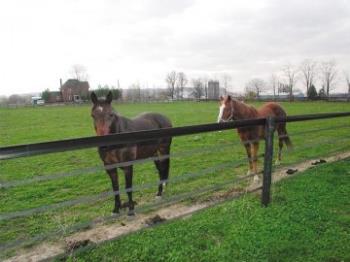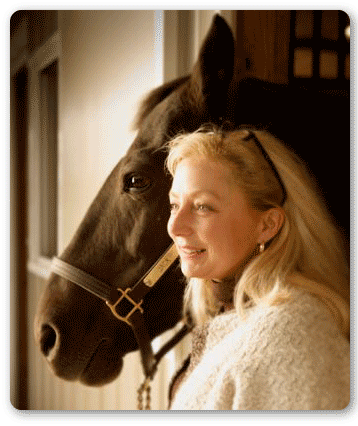Fencing and Stall Considerations for Any Breed or Size

I do have my favorites, but horses are so diverse that it makes it interesting to work with all breeds and sizes. Which brings us to a subject that each of us will need to consider with our horses: what to look for when choosing fencing and stalls for your breed and size of horses.
Horses need good horse stalls and fencing to fit their needs, and for protection.
As uniquely created as people, so are horses in personality and size. One common thread, however, is that they are able to think and react from the instinct of prey and predator (our horses being prey, and us as the predator). Also, in the threat of danger, (to our horses it could be plastic bag blowing in the wind), they are flight animals. These beautiful, strong animals need fencing and stalls (their homes), to fit their needs and protect them.
When planning your horse fencing system, think about safety first.
None of us want to have to nurse any kind of injury with our horses. They can be difficult patients and can sometimes be hurt to the point of no longer being able to perform. The best way to go with fencing is a wide rail, 5.25", in a four-rail flexible fence system. This covers the rule of thumb; a fence that is 50-60" tall (taller fence posts may require 5 rails) with spacing of 6-11'' between rails. Your first rail should be placed approximately 2" from the top of the post, and there should be approximately 8-12" from the ground to your bottom rail. If your horses are abusive or challenge fences frequently, electric fence will need to be added to the flexible fence. This not only offers added protection for your horses, but also helps reduce maintenance expenses on your fence system.
Stall considerations should be looked at from the same view: safety first then comfort.
Most horses, even large and tall, can comfortably rest in a 12'x12' stall. Ten-foot by ten-foot, or 12' x 10' stalls are also suitable for average size horses. Additionally, you must consider the amount of time your horse will spend in his stall. Is the stall being used for foaling, or is it being used for stall rest? This will help you determine if a larger stall is necessary. Don’t forget that most extension agencies still advocate plans for tie stalls, and as times change, so does the popular opinion of what is "correct."
Your budget is another consideration.
Strength and durability of products must be looked at for your breed and size of horse. Do your homework and get actual facts on specs of products. Some specs actually sound weaker, but in reality, are stronger. For example, in polymer coated wire fencing, gauges of wire run in number definitions. Twelve-gauge wire is the strongest made, and 16-gauge is weaker. However, if more wires are used together within the rail, the strength of the overall product may be just as strong as a 12-gauge product at a better price. The same is true with stalls; the gauge of the steel may sound like a lower number rating, when in fact, lower numbers indicate stronger steel. Find the best product at the best price (which may not be the absolute lowest), without sacrificing safety. The extra time taken in considering this investment will be worth it now, and later.
Is moving to another farm a possibility in the future?
By using a 4-rail Flex-Fence system and considering electric with your fence, any size or breed of horse could easily be contained in a well-planned pasture. The same holds true with larger stall sizes. These few steps make your farm more attractive and useful to a future owner. Additionally, it boosts your property value.
To me it is simple; look at what will work best for you in your situation. Find a fence and stall expert and tell them your particular situation, and get some good advice. Plan ahead. Consider your horse breed, size and personality and go with the best you can afford. After all, your horse will appreciate your thoughtfulness. You will definitely see it in his attitude, which affects all of the work you do together.
 Debbie has over 45 years experience with horses and equine-related businesses. She has owned, trained, boarded horses and run stables at various times in her career. She is a certified fence installer, has given balanced riding lessons, and has shown horses in Western, Western Pleasure, Trail, English, Hunter/Jumper, Fox Hunting, Hunter Trials, Dressage and driving classes. Debbie has been involved in foaling, and just about every aspect of horse ownership possible, and she welcomes your questions and comments. If you are interested in using any articles by Debbie, please send her an email.
Debbie has over 45 years experience with horses and equine-related businesses. She has owned, trained, boarded horses and run stables at various times in her career. She is a certified fence installer, has given balanced riding lessons, and has shown horses in Western, Western Pleasure, Trail, English, Hunter/Jumper, Fox Hunting, Hunter Trials, Dressage and driving classes. Debbie has been involved in foaling, and just about every aspect of horse ownership possible, and she welcomes your questions and comments. If you are interested in using any articles by Debbie, please send her an email.
RAMM Fence Systems, Inc. makes every effort to provide reliable and useful information on horse health, care and products. The statements made on this website are based on years of experience with horses, however, they are based on generalized situations and should not replace diagnosis or treatment by a veterinarian or consultation by a professional. RAMM Fence Systems, Inc. does not assume any legal responsibility. Readers should always consult qualified health care providers for specific diagnosis and treatment.
